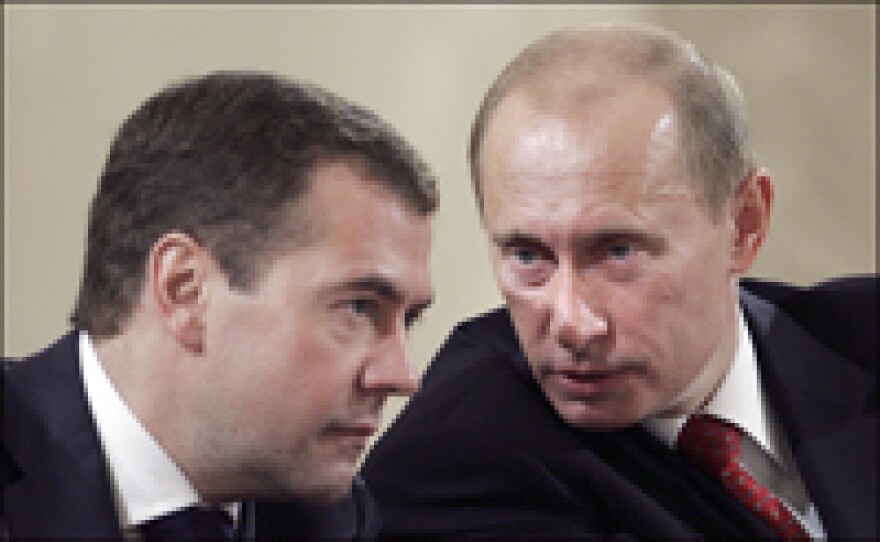

Dmitri Medvedev, Russia's newly elected president, is a protege of Vladimir Putin's from their days in the St. Petersburg city government.
The technocrat, who has not previously held elected office, had no meaningful opposition in Sunday's election, which he won with more than 70 percent of the vote.
Some Western observers have portrayed him as a puppet who will follow Putin's policies and possibly keep the presidential chair warm for his boss to return in four or eight more years.
Echoes of that mindset emerged in the latest Democratic presidential debate, when Sen. Hillary Clinton described Medvedev as "someone who is obviously being installed by Putin, who Putin can control, who has very little independence." In the same debate, Sen. Barack Obama called Medvedev's candidacy "a clever but transparent way for Putin to hold on to power."
Earlier, Republican presidential candidate John McCain said Putin's endorsement of Medvedev meant that Putin had "just made himself president for life."
Role of Medvedev's Background
Russia policy experts don't necessarily agree that Medvedev will be simply a rubber stamp for Putin's agenda or that U.S. foreign policy should proceed on that assumption.
Andrew Kuchins of the Center for Strategic and International Studies says "we should leave ourselves open to taking Medvedev seriously."
Kuchins notes that Medvedev, who is 42, comes from a background that's very different from that of his mentor, who is 55. In the context of Russia, Kuchins says, the age difference is important, because it means that Putin spent a significant part of his career under the Soviet system, whereas Medvedev did not.
Medvedev has a background as a law professor and as the general council for a big pulp company, while Putin worked for the KGB, the Soviet intelligence service.
Kuchins notes that in a key policy speech, delivered on Feb. 15 in the Siberian city of Krasnoyarsk, Medvedev addressed some of Russia's problems in a way that was different from Putin's approach during his eight years in office.
"You couldn't ask for a more liberal-sounding speech from a Russian leader in today's context," Kuchins says.
Anders Aslund, of the Peterson Institute for International Economics, agrees that the Krasnoyarsk speech could be a sign that Medvedev is "something different." He says Medvedev acknowledged public complaints against Russia's legal system, its culture of corruption, and its bloated civil service.
"He said there's no reason to have so many government officials on the boards of state corporations, and he's taken a strong stand on private property rights. He's spoken up against monopolies. He wants to lower taxes and simplify the tax code," Aslund says.
Aslund notes that Putin made a more liberal speech himself, about a week earlier, but that Medvedev's speech went farther.
Horton Beebe-Center, president of the Eurasia Foundation, says both speeches were not so much expressions of liberalism as of pragmatism.
The question, he says, is "to what extent Medvedev and Putin understand the serious challenges that Russia faces today."
"No one can deny the tremendous economic performance of Russia over Putin's two terms, but fundamental structural problems remain," he says.
Kuchins says much of that success is because Russia is a major oil producer in a time of surging oil prices.
"Russia has been able to achieve impressive growth rates during the Putin years without having to do much right," he says. But Russia is already facing problems with its oil production. "Production has started to diminish, and they haven't made adequate investments to sustain it."
Moving into the Future
Medvedev has already pledged to name Putin prime minister, and Putin has said he wants the job. The prime minister's powers are now subordinate to those of the president, and it's not clear how that might change.
All three observers agree that the future depends on the balance of power between the two men. As Beebe-Center puts it, "there's only one person who knows how much power the next president of Russia will have, and that's Mr. Putin."
Beebe-Center says the uncertainty is compounded by the fact that both Russia and the United States will have new presidents by this time next year, but he says that offers both sides a new chance to engage each other.
Kuchins says that during past transitions of leadership in Russia, the new leaders have tended to be more accommodating to the United States. "If that happens," he asks, "will the U.S. be ready for it?"
Kuchins says that what the United States can do is engage Medvedev at face value, as the real leader of the country, and help establish his credibility with the international community. He says that should include completing an agreement on nuclear cooperation with Russia, and help with Russia's accession to membership in the World Trade Organization.
"That would give Medvedev something to show his people from the relationship with the U.S.," Kuchins says.
Kuchins also says U.S. leaders should resist the urge "to take cheap shots at Russia." He says there's not much for any of the presidential candidates to gain by appearing soft on Russia, but that also means that there's not much for any Russian leader to gain by seeming too conciliatory to the United States.
Aslund, a longtime critic of Putin, also warns that the Russian president famously plays his cards close to the chest, and that he may have more surprises in store.
"My perception," Aslund says, "is that he already changed his scheme several times" before naming Medvedev. "Putin has said so many different things that are not true."
Aslund says he now thinks Putin may not take the prime ministership, but could instead take some other position, such as chairman of Russia's Constitutional Court. "The fundamental thing is that we don't know."
Copyright 2022 NPR. To see more, visit https://www.npr.org. 9(MDAzMjM2NDYzMDEyMzc1Njk5NjAxNzY3OQ001))





